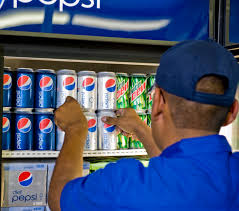With the markets near all-time highs, yet vulnerable to a slowing global economy at risk of further disruption by the COVID-19 outbreak, income investors may find it constructive to double down on safe dividend plays this year. PepsiCo's (PEP 0.17%) fourth-quarter earnings and 2020 outlook, released Thursday, exemplify why this Dividend Aristocrat should be a core holding in income-oriented portfolios. Below, we'll review the fourth quarter and delve into both PepsiCo's current-year financial outlook and its plan for dividend payouts and share repurchases. Note that all comparative numbers refer to the prior-year quarter.
PepsiCo: The headline numbers
| Metric | Q4 2019 | Q4 2018 | Change |
|---|---|---|---|
| Revenue | $20.6 billion | $19.5 billion | 5.6% |
| Net income | $1.8 billion | $6.9 billion | N/A |
| Diluted EPS | $1.26 | $4.83 | N/A |
Data source: PepsiCo. EPS = earnings per share. N/A=Not applicable due to a one-time gain in the prior-year quarter (discussed below).
Highlights of the last three months
- After adjusting for foreign currency translation and the effects of acquisitions and dispositions, PepsiCo booked impressive organic revenue growth of 4.3% and finished the year with organic growth of 4.5%.
- PepsiCo realized approximately two percentage points of expansion from increased volume and approximately two percentage points from pricing power.
- Revenue performance was anchored by 3% organic growth in each of PepsiCo's two largest segments, Frito-Lay North America (FLNA) and PepsiCo Beverages North America (PBNA). These segments combined for $11.4 billion in revenue, or roughly 55% of the company's top line.
- Notably, the company's LatAm (Latin America), Europe, APAC (Asia Pacific, Australia and New Zealand, and China), and AMESA (Africa, Middle East, and South Asia) segments all achieved organic growth in the mid-single-digit to high-single-digit range.
- PepsiCo's gross margin improved by 50 basis points to 54.7%, while operating margin rose by 60 basis points to 13.1%.
- The difference in net earnings between periods as seen in the table above is due to a $4.9 billion income tax provision benefit recorded in the fourth quarter of 2018. On an adjusted basis, Q4 2019 EPS of $1.45 decreased by 2.7% against the $1.49 earned in the fourth quarter of 2018.

Image source: Getty Images.
The 2020 outlook and capital allocation plans
PepsiCo is aiming to replicate its brisk growth in 2019 during the current year. The company's guidance outlook issued alongside earnings anticipates organic revenue growth of 4% in 2020. Management expects core (adjusted) earnings per share to improve by 7% year over year in constant-currency terms. This equates to $5.92 in core 2020 EPS, versus $5.53 earned in 2019.
PepsiCo also supplied its annual capital allocation plan, which is watched closely by dividend-seeking shareholders. PepsiCo generated $9.6 billion in operating cash flow in 2019, and the company foresees a leap in operating cash generation -- to $11 billion -- in 2020.
The consumer staples titan plans to spend $5 billion this year on capital expenditures, leaving $6 billion in free cash flow. This $6 billion will be utilized in shareholder-friendly actions. In its earnings release, PepsiCo announced a 7% dividend increase, marking its 48th consecutive year of dividend hikes. At current share price, this equates to a handsome annual yield of 2.8%.
The company ballparks its current-year dividend obligation at $5.5 billion, and it plans to repurchase $2 billion worth of its shares on the open market. Total shareholder returns of $7.5 billion, then, will outstrip free cash flow by $1.5 billion, which indicates that PepsiCo will undertake some short- or long-term debt financing this year. With a debt-to-EBITDA (earnings before interest, taxes, depreciation, and amortization) ratio of just 2.4 times, PepsiCo has plenty of borrowing capacity on its balance sheet to supply the cash differential.
While few would classify PepsiCo as a growth stock, it still offers aggressive revenue expansion in comparison to its multinational packaged food and beverage peers; moreover, it's also a relatively stable investment that tends to hold its value in periods of macroeconomic stress. Given its superb cash flow generation, history of dividend increases, and handsome yield, PepsiCo is a prime candidate in the exercise of shoring up income portfolios against potential market adversity later this year.






